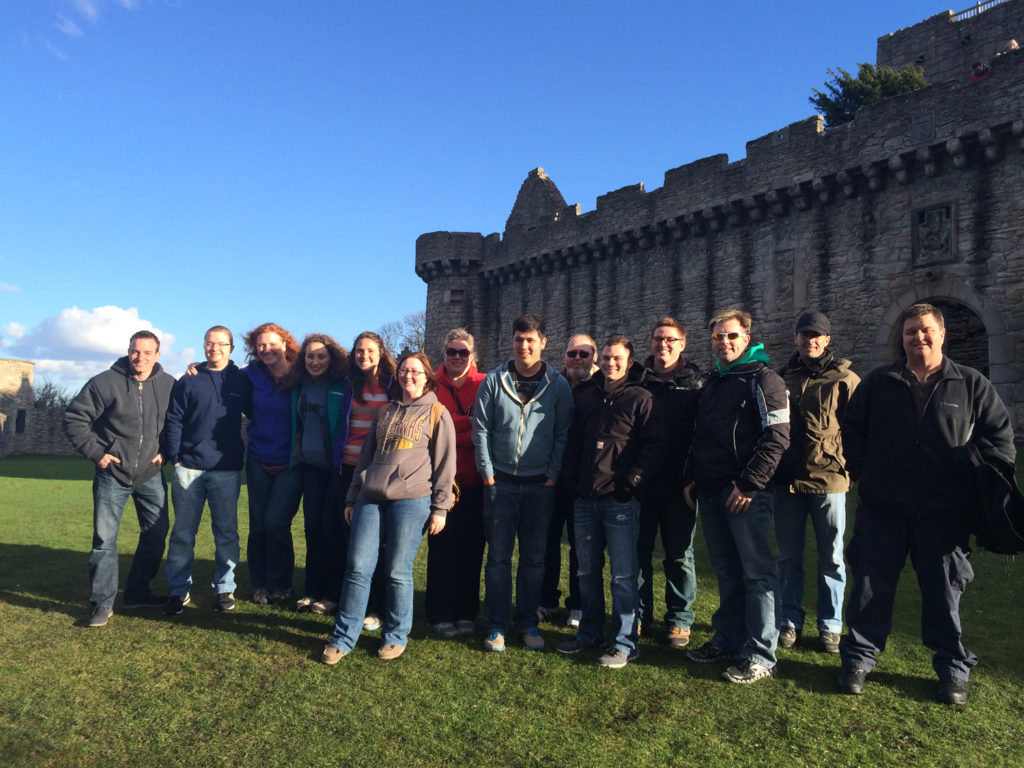SEBTS on Mission to Scotland
January 19, 2017

Stephen B. Eccher, assistant professor of church history and reformation studies at Southeastern, shares highlights from a weeklong Southeastern mission trip he led to Scotland this spring. Eccher earned a Master of Letters and Ph.D. from the University of St Andrews in Scotland.
Q: Why Scotland?
A: As a church history professor, Scotland has a historically rich tradition in Christianity. During the Protestant reformation in the 16th century, John Knox thoroughly reformed the Scottish church leaving a long, storied Christian presence in Scotland. Located in Western Europe, Scotland may now be best categorized as secular progressive, a truly post-Christian nation, which follows the paradigm of other European countries.
Only two percent of people profess to be Christians in Scotland and of that, one-half percent are evangelical Christians. The country broke away from its Christian heritage and now some church buildings are used for nightclubs and pubs.
Q: Who was on the team?
A: Nine SEBTS students, one of whom is an IMB missionary serving in Germany. Jimmy Marston, a SEBTS trustee, also participated as his second international mission trip after Oaxaca, Mexico with me this year.
Q: What was a major goal of the trip?
A: The goal was to work in the Edinburgh “schemes.” A scheme could be defined as modern American urban housing projects melded with the Native American reservation. The towns are self-contained; people rarely leave them and each scheme has its own identity. They are a very low income, poverty-stricken environments. Most people born in a scheme will live and die in the very same scheme. We focused on the Niddrie scheme in a section just outside Edinburgh with a population of 10,000 to 15,000 people.
We were partnering with the Niddrie Community Church. Mez McConnell, founder of 20schemes and pastor of the Niddrie church, along with Matthew Spandler-Davidson, a Scottish native pastoring in Kentucky, lead the organization. 20schemes desires to plant 20 evangelical churches within a 10-year window.
Q: What was the primary ministry done during the mission?
A: Learning 20schemes’ ministry methodology in a destitute environment was a major component. They do life-on-life discipleship with a slow-cook mentality. 20schemes is into making disciples, not securing confessions of faith. New believers often struggle with poverty, drug addiction, crime and homelessness; new converts are immediately moved into homes with local Christians.
Q: What is a favorite story from the trip?
A: Even though the trip was over, we were still on mission as we flew from Edinburgh to London. Taxiing on the tarmac a member of the team began sharing the Gospel with two ladies. Shortly after takeoff, before the plane even leveled off, one of the ladies forcibly moved seats. This was a picture of a truly hardened heart; a grown woman frantically climbing over other passengers and past shouting flight attendants to avoid hearing the gospel. The scene was both comical and sad; a vivid reminder of the importance of faithfulness in sharing, but also of the desperately wicked heart of the lost.
Q: How did Southeastern prepare you for this trip?
A: Going on a trip like this becomes second nature because the idea of mission and the Great Commission is so embedded in the DNA of everything we do here. It doesn’t matter whether it is teaching or interacting with students, all of campus life is rooted in a Kingdom mindset.
Q: What advice would you give to someone considering going on an international mission trip?
A: Jump into the deep end of the pool! Often, there is a tendency to wade in and find an easy context. Jump in no matter how difficult or awkward it looks. Wrap your arms around the mission and embrace the experience. It is not going to be easy and comfortable, but it will be worth it. It comes back to Dr. Akin’s question, “Not why should I go, but why should I stay?”
Q: Where else have you traveled?
A: This is my fourth SEBTS mission trip in the past 11 months (Seattle, Washington, Oaxaca, Mexico and Baltimore, Maryland in June).
Q: What did God teach you through this experience?
A: What really challenged me the most is the question, what am I doing in terms of life-on-life discipleship? I lead a care group at my local church but it is not like the 20schemes guys are. We are not living together and functioning together. Everything is so compartmentalized in our culture.
Q: How do you see this mission trip as a way to fulfill the Great Commission?
A: The Great Commission is not about securing professions of faith, it is about making disciples. It is a difficult, long and tedious task to make a disciple, especially when changing a life in the midst of a poverty-stricken culture. Ultimately, it takes the transforming power of God through the Holy Spirit to work and make disciples of Jesus. We are called to simply go and share; God does the real heavy lifting of conversion.
To view photos from the trip, please click here.